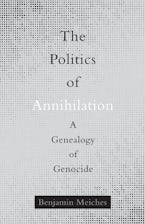"Concepts are always political-and perhaps never more so than when they classify and rank the evils that can befall human beings. Benjamin Meiches’s extraordinary genealogy of the notion of genocide since its coinage during World War II is especially welcome, blending empirical cases, historical perspectives, and theoretical considerations in an ideal fashion. Emphasizing the lability of this concept before it was fixed in our time, for better or worse, Meiches shows how talk of genocide has allowed for moralizing in a violent world, even as it obstructs other perspectives that the future will require." -Samuel Moyn, Yale Law School
"A well-written, cogently argued, significant contribution to a nuanced understanding of how the idea of genocide has emerged and why it matters to world politics."-CHOICE
"A far-reaching critique of mainstream presumptions in the field and beyond, Annihilation presents theoretically-sophisticated engagements with a vast array of genocide scholarship backed by numerous case studies."-PoLAR
"The Politics of Annihilation is a valuable contribution to current scholarship on genocide, considerably expanding the scope of the field. Its originality is compounded by an extensive and demonstrable breadth of knowledge, and its critical appraisal makes it both a pertinent resource and a rich point of departure for future research."-H-Net Reviews
"The Politics of Annihilation is a wide-ranging and insightful deep dive into the contested, often controversial, and complex discursive politics of genocide."-The Review of Politics
"Meiches has successfully provided a deep dive into discursive tussles and contestations that have unfolded underneath the ‘stable’ assumptions of the concept of genocide as we know it, highlighting not only the fluid ground on which much of our understanding of the concept rests, but also how these assumptions shape action."-International Affairs

